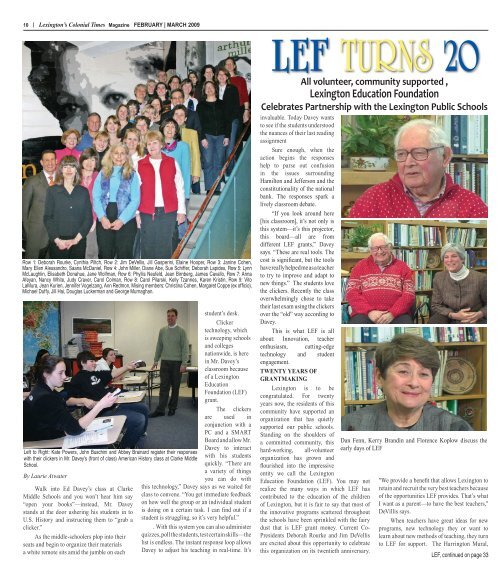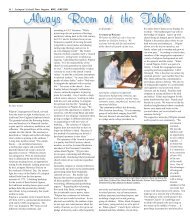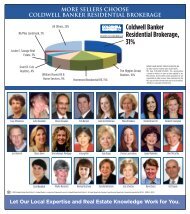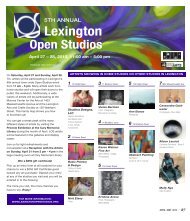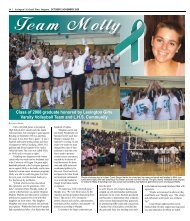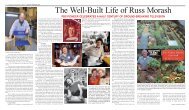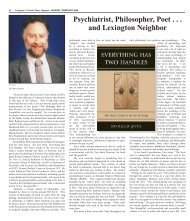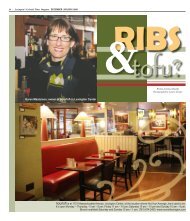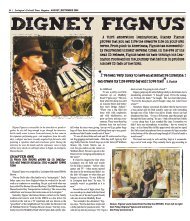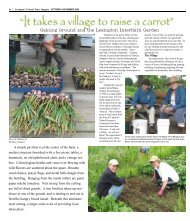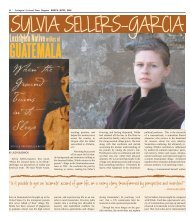LEF Turns 20! - Colonial Times Magazine
LEF Turns 20! - Colonial Times Magazine
LEF Turns 20! - Colonial Times Magazine
Create successful ePaper yourself
Turn your PDF publications into a flip-book with our unique Google optimized e-Paper software.
10 | Lexington’s <strong>Colonial</strong> <strong>Times</strong> <strong>Magazine</strong> FEBRUARY | MARCH <strong>20</strong>09<br />
Row 1: Deborah Rourke, Cynthia Piltch, Row 2: Jim DeVellis, Jill Gasperini, Elaine Hooper, Row 3: Janine Cohen,<br />
Mary Ellen Alessandro, Saana McDaniel, Row 4: John Miller, Diane Abe, Sue Schiffer, Deborah Lapides, Row 5: Lynn<br />
McLaughlin, Elisabeth Donahue, Jane Wolfman, Row 6: Phyllis Neufeld, Jean Birnberg, James Cavallo, Row 7: Anna<br />
Afeyan, Nancy White, Judy Craver, Carol Colman, Row 8: Carol Pilarski, Kelly Tzannes, Karen Kristin, Row 9: Vito<br />
LaMura, Jean Kurien, Jennifer Vogelzang, Ann Redmon, Mising members: Christina Cohen, Margaret Coppe (ex officio),<br />
Michael Duffy, Jill Hai, Douglas Luckerman and George Murnaghan.<br />
Walk into Ed Davey’s class at Clarke<br />
Middle Schools and you won’t hear him say<br />
“open your books”—instead, Mr. Davey<br />
stands at the door ushering his students in to<br />
U.S. History and instructing them to “grab a<br />
clicker.”<br />
As the middle-schoolers plop into their<br />
seats and begin to organize their materials<br />
a white remote sits amid the jumble on each<br />
student’s desk.<br />
Clicker<br />
technology, which<br />
is sweeping schools<br />
and colleges<br />
nationwide, is here<br />
in Mr. Davey’s<br />
classroom because<br />
of a Lexington<br />
Education<br />
Foundation (<strong>LEF</strong>)<br />
grant.<br />
The clickers<br />
are used in<br />
conjunction with a<br />
PC and a SMART<br />
Board and allow Mr.<br />
Davey to interact<br />
with his students<br />
quickly. “There are<br />
a variety of things<br />
you can do with<br />
this technology,” Davey says as we waited for<br />
class to convene. “You get immediate feedback<br />
on how well the group or an individual student<br />
is doing on a certain task. I can find out if a<br />
student is struggling, so it’s very helpful.”<br />
. With this system you can also administer<br />
quizzes, poll the students, test certain skills—the<br />
list is endless. The instant response loop allows<br />
Davey to adjust his teaching in real-time. It’s<br />
Left to Right: Kate Powers, John Buschini and Abbey Brainard register their responses<br />
with their clickers in Mr. Davey's (front of class) American History class at Clarke Middle<br />
School.<br />
By Laurie Atwater<br />
<strong>LEF</strong> TURNS <strong>20</strong><br />
All volunteer, community supported ,<br />
Lexington Education Foundation<br />
Celebrates Partnership with the Lexington Public Schools<br />
invaluable. Today Davey wants<br />
to see if the students understood<br />
the nuances of their last reading<br />
assignment<br />
Sure enough, when the<br />
action begins the responses<br />
help to parse out confusion<br />
in the issues surrounding<br />
Hamilton and Jefferson and the<br />
constitutionality of the national<br />
bank. The responses spark a<br />
lively classroom debate.<br />
“If you look around here<br />
[his classroom], it’s not only is<br />
this system—it’s this projector,<br />
this board—all are from<br />
different <strong>LEF</strong> grants,” Davey<br />
says. “These are real tools. The<br />
cost is significant, but the tools<br />
have really helped me as a teacher<br />
to try to improve and adapt to<br />
new things.” The students love<br />
the clickers. Recently the class<br />
overwhelmingly chose to take<br />
their last exam using the clickers<br />
over the “old” way according to<br />
Davey.<br />
This is what <strong>LEF</strong> is all<br />
about: Innovation, teacher<br />
enthusiasm, cutting-edge<br />
technology and student<br />
engagement.<br />
TWENTY YEARS OF<br />
GRANTMAKING<br />
Lexington is to be<br />
congratulated. For twenty<br />
years now, the residents of this<br />
community have supported an<br />
organization that has quietly<br />
supported our public schools.<br />
Standing on the shoulders of<br />
a committed community, this<br />
hard-working, all-volunteer<br />
organization has grown and<br />
flourished into the impressive<br />
entity we call the Lexington<br />
Education Foundation (<strong>LEF</strong>). You may not<br />
realize the many ways in which <strong>LEF</strong> has<br />
contributed to the education of the children<br />
of Lexington, but it is fair to say that most of<br />
the innovative programs scattered throughout<br />
the schools have been sprinkled with the fairy<br />
dust that is <strong>LEF</strong> grant money. Current Co-<br />
Presidents Deborah Rourke and Jim DeVellis<br />
are excited about this opportunity to celebrate<br />
this organization on its twentieth anniversary.<br />
Dan Fenn, Kerry Brandin and Florence Koplow discuss the<br />
early days of <strong>LEF</strong><br />
"We provide a benefit that allows Lexington to<br />
retain and recruit the very best teachers because<br />
of the opportunities <strong>LEF</strong> provides. That’s what<br />
I want as a parent—to have the best teachers,"<br />
DeVillis says.<br />
When teachers have great ideas for new<br />
programs, new technology they or want to<br />
learn about new methods of teaching, they turn<br />
to <strong>LEF</strong> for support. The Harrington Mural,<br />
<strong>LEF</strong>, continued on page 33
"I am continually inspired by Lexington’s<br />
commitment to our children, our schools and<br />
our town. <strong>LEF</strong> is an embodiment of Lexington’s<br />
values ~ our long-standing tradition of educational<br />
excellence and the belief that strong schools are vital<br />
to the well-being of our community. <strong>LEF</strong> enables<br />
parents, individuals and businesses to partner with<br />
educators to bring fresh ideas, new technology and<br />
innovative instruction into our classrooms."<br />
Steve Solly<br />
PhysEd, LHS<br />
Recreational Activities<br />
Solly wrote a grant to fund a<br />
physical Education class called<br />
Recreational Activities.<br />
“I got the idea because I wanted<br />
to offer some alternative<br />
things that might engage a kid<br />
that’s turned off by the more<br />
traditional programs,” Solly<br />
says.<br />
“The research that I was<br />
studying showed that if kids can<br />
have some positive success at<br />
lower intensity activities that<br />
focus on the social component,<br />
Current <strong>LEF</strong> Co-President Deborah Rourke<br />
HHH<br />
More Grants on<br />
Page 33<br />
you can use it as a gateway to<br />
more active sports.”<br />
“Because of the grant we will<br />
be able to offer 10 sections<br />
of Recreational Activities this<br />
spring. Every couple of lessons<br />
the activities will change and<br />
we’ll offer Bocce, Horseshoes,<br />
Shuffleboard, Table Tennis and<br />
Croquet.”<br />
According to Solly this is yet<br />
another addition to a pretty<br />
impressive portfolio of nontraditional<br />
Physical Education<br />
classes offered at LHS. “We<br />
have a class called fitness<br />
walking and we also offer yoga<br />
and Pilates.”<br />
Avon Lewis<br />
Earth Science, LHS<br />
Kill-a-Watts<br />
Avon Lewis is an Earth<br />
Science teacher at Lexington<br />
High School.<br />
“The two <strong>LEF</strong> grants I’ve<br />
received in the past two have<br />
had a huge impact on the way<br />
we teach earth science,” she<br />
says.<br />
As part of the 9 th grade earth<br />
science curriculum, they had<br />
been working on a project to<br />
try to get freshman to look<br />
at their household’s energy<br />
footprint.<br />
“The first year the students had<br />
H<br />
Lucia Gates<br />
Guidance<br />
Counselor, Bridge<br />
Open Circle/K-5<br />
Social Competency<br />
“Our site-based council at<br />
Bridge did a survey that<br />
revealed students weren’t<br />
feeling as emotionally safe<br />
as we would have liked,” she<br />
explains.<br />
As a result she wrote a grant<br />
to support Open Circle, a<br />
robust program that helps<br />
kids develop problem solving<br />
skills—what is known as SEL<br />
(social emotional learning).<br />
The Open Circle program was<br />
FEBRUARY | MARCH <strong>20</strong>09 Lexington’s <strong>Colonial</strong> <strong>Times</strong> <strong>Magazine</strong> | 11<br />
GRANTED<br />
EXCITING PROGRAMS FUNDED<br />
THROUGH <strong>LEF</strong> GRANTS<br />
to estimate the use of the items<br />
in their house from written<br />
tables with average outputs for<br />
common appliances things like<br />
toasters,” Lewis explains. “The<br />
students really didn’t believe in<br />
the numbers, so their buy-in<br />
to the program wasn’t good.<br />
So we wrote a grant for these<br />
devices that actually let the<br />
students measure the energy<br />
output in their home. We<br />
bought enough so that each<br />
kid could take one of these<br />
devices home for two weeks.<br />
The data is much better and<br />
the students are learning<br />
hands-on so the buy-in has<br />
gone way up.”<br />
The <strong>LEF</strong> grant helped to buy<br />
Don't Miss <strong>LEF</strong>'s Gala Celebration<br />
March 21, <strong>20</strong>09 from 6:30-Midnight<br />
Westin Waltham-Boston Hotel<br />
Tickets are on sale now!<br />
Call 781-372-3288,<br />
email lexed@att.net or visit<br />
lexedfoundation.org for more info.<br />
developed at The Stone Center<br />
in Wellesley. “They began<br />
doing research into SEL and<br />
found that there was nothing<br />
out there that met the needs<br />
so they developed Open Circle<br />
based on the research they<br />
were doing,” Gates says.<br />
“The beauty of Open Circle<br />
is that it is a comprehensive<br />
program. It is K-5 and<br />
thankfully because of <strong>LEF</strong> it’s<br />
been implemented in every<br />
classroom in all six elementary<br />
schools,” Gates says. Bridge<br />
and Bowman were the first<br />
schools that were funded to<br />
do the whole school approach<br />
and then the others followed.<br />
Because of their <strong>LEF</strong> grant,<br />
the supplies and fund the<br />
development of the materials.<br />
“An enormous amount of<br />
time has gone into writing<br />
the documents that make the<br />
project possible. At least once<br />
a month I get an inquiry from<br />
another school system that<br />
wants to do a similar program<br />
so it’s become a point of<br />
leadership,” Lewis says.<br />
“Because we’ve had this grant<br />
we’ve been able to develop<br />
this program that’s not only<br />
been great for our community<br />
but has been used by others<br />
as well.”<br />
the staff was able to go to<br />
the Open Circle training as a<br />
group. “The energy of having<br />
the entire teaching staff in one<br />
place, learning something new,<br />
feeding off each other trying<br />
things—it was marvelous!<br />
That was a joint effort between<br />
<strong>LEF</strong> funding the actual training<br />
costs and the system picking<br />
up the cost of substitutes—it<br />
was marvelous.”<br />
After the implementation of<br />
the program they administered<br />
the survey again and found<br />
a significant improvement.<br />
Anecdotally the teachers found<br />
a great improvement in hallway<br />
and playground behavior as<br />
well.
<strong>LEF</strong>, continued from page 11<br />
Big Backyard, Open Circle, Project<br />
Adventure and SMART Boards and<br />
the brand new program with the<br />
Lexington Symphony (see story on<br />
page 24) are a few of the programs<br />
funded through <strong>LEF</strong> grants<br />
throughout the years.<br />
These innovative projects along<br />
with professional development and<br />
teacher mentoring are not provided<br />
for in the regular school budget.<br />
They are the “extras” that move<br />
Lexington beyond average and help<br />
our students to thrive and compete.<br />
<strong>LEF</strong> is a vital organization<br />
because Lexington gets it: The best<br />
thing we can do for our students<br />
is to attract and retain the very<br />
best teachers and the best thing<br />
we can do for<br />
our teachers<br />
is to provide<br />
structure,<br />
support,<br />
stability and<br />
opportunities<br />
for professional<br />
growth.<br />
This very<br />
fundamental<br />
concept is often<br />
obscured by<br />
the politics of<br />
running a school<br />
district. They<br />
are definitely<br />
challenged<br />
when economic<br />
times are tough,<br />
but amid the din<br />
of opinions on the subject of public<br />
education, good teachers are at the<br />
heart of any meaningful discussion<br />
about quality schools.<br />
That’s where the <strong>LEF</strong> story<br />
begins—with the huge financial<br />
challenge posed by the passage of<br />
Proposition 2 ½.<br />
DEEP COMMUNITY ROOTS<br />
In 1988 Lexington citizens were<br />
worried. Concern about the effects of<br />
Proposition 2 ½ (passed in 1980) on<br />
the quality of the Lexington Public<br />
Schools was growing. Prior to 2 ½<br />
the community had supported the<br />
schools generously. Lexingtonians<br />
had always embraced support for<br />
the schools as a shared community<br />
value.<br />
With the adoption of 2 ½ the<br />
dynamic shifted and the resulting<br />
school cuts alarmed school<br />
administrators and residents alike.<br />
Dan Fenn and Kerry Brandin<br />
reflected on those early days in an<br />
interview for the <strong>20</strong> th Anniversary<br />
celebration DVD.<br />
“Phil Geiger was the<br />
Superintendent at the time and he<br />
came to me sometime in 1988,”<br />
recalls Dan Fenn, Founding Chair<br />
of <strong>LEF</strong>, “and talked to me about<br />
community foundations to support<br />
the schools.” Geiger had good<br />
instincts when he asked Fenn to<br />
lead the charge—Fenn was the the<br />
Founding Director of the Kennedy<br />
Library knew his way around town<br />
politics as well.<br />
Dan reflects that Lexington<br />
was “bitterly divided politically<br />
in those days.” He calls it the “we/<br />
they” thing and he knew that the<br />
new foundation had to find a way<br />
Box City at the Mariah Hastings School<br />
to exist outside the maelstrom of<br />
town politics or it would be sucked<br />
into the vortex. “It was clear to me<br />
that the first thing to do was to put<br />
together a board that bridged the<br />
gap,” he says. “So we had political<br />
conservatives and political liberals<br />
on that first board.”<br />
Fenn says Alan Fields, who<br />
was “so critical to the whole effort<br />
from the start” suggested he go<br />
after Kerry Brandon for the board.<br />
Kerry had kids in the schools at the<br />
time and was just coming off the<br />
very successful Center Playground<br />
project.<br />
Kerry joined the effort because<br />
“there was real concern about funds<br />
being more and more restricted,<br />
things getting cut and teacher<br />
morale.” She was surrounded by<br />
board members whose kids had gone<br />
through the schools pre-Prop 2 ½.<br />
“They brought that memory of the<br />
<strong>LEF</strong>, continued on page 36<br />
Valerie Franks,<br />
Science<br />
Diamond Middle<br />
SchoolIntegrating<br />
Technology and<br />
Engineering<br />
Design<br />
“We are required by the<br />
state to meet objectives<br />
in science strands that<br />
focus on technology and<br />
engineering,” Franks<br />
says. The grant covered<br />
technology that could be<br />
used by all three grades<br />
Susan Bennett,<br />
Director<br />
Lexington<br />
Historical Society<br />
<strong>Colonial</strong> Life and<br />
the American<br />
Revolution<br />
The Lexington Historical<br />
Society and former Lexington<br />
High School teacher and<br />
archivist Dick Kollen has<br />
received two <strong>LEF</strong> grants<br />
over the past two years. The<br />
grants have been used for<br />
curriculum development for<br />
American history units K-8.<br />
This is a perfect example of<br />
how <strong>LEF</strong> has reached out<br />
beyond the schools to engage<br />
the community.<br />
FEBRUARY | MARCH <strong>20</strong>09 Lexington’s <strong>Colonial</strong> <strong>Times</strong> <strong>Magazine</strong> | 33<br />
GRANTED<br />
EXCITING PROGRAMS FUNDED<br />
THROUGH <strong>LEF</strong> GRANTS<br />
on projects that addressed<br />
engineering and design.<br />
Specifically the <strong>LEF</strong> funded<br />
13 laptops, a cart an<br />
Enfocus box and software.<br />
“For example the 8th grade<br />
is working on a project<br />
around bridges following the<br />
technology standards for<br />
the design and engineering<br />
process. The students do<br />
some research—they’re<br />
gathering information<br />
and they’re drawing up<br />
prototypes of their own.<br />
Then they’re constructing<br />
HHH<br />
“The Society realized a few<br />
years back that its education<br />
programs for visiting school<br />
groups were really outmoded.<br />
In particular they didn’t further<br />
curriculum standards that<br />
the teachers have to follow,”<br />
Susan Bennett explains.<br />
“Much to our dismay we were<br />
finding that a lot of the classes<br />
in Lexington were going out of<br />
town to Concord to do their<br />
units on <strong>Colonial</strong> Life and the<br />
American Revolution.”<br />
“We felt that every Lexington<br />
student at least a couple of<br />
points in their school career<br />
should visit the historic<br />
houses and tour the green<br />
and learn about Revolutionary<br />
War history right here in town<br />
something, testing it<br />
rebuilding it and presenting<br />
their ideas to the class in a<br />
Power Point presentation,”<br />
Franks explains.<br />
“<strong>LEF</strong> has provided us with<br />
this new technology. The<br />
laptops are very mobile<br />
so they are time efficient<br />
and we can integrate all<br />
kinds of mass media into<br />
our teaching. The kids are<br />
used to this at home and<br />
now we have it right here at<br />
our fingertips,” Franks says.<br />
“As a science department<br />
we are technologically<br />
advanced.”<br />
where it all happened.”<br />
“So we applied for the <strong>LEF</strong><br />
grant and we also got funding<br />
from the Massachusetts<br />
Foundation for the Humanities<br />
Massachusetts Society of the<br />
Cincinnati and we basically<br />
threw everything out and<br />
started from scratch. Our<br />
focus is on 3 rd 5 th and 8 th grade<br />
and to some extent American<br />
History students at the high<br />
school.<br />
In addition to Historical Society<br />
staff, they have had a team of<br />
teachers—Vicky Schwartz,<br />
Leslie Colby, Matthew Mehler<br />
and Mary Morris—from the<br />
Lexington schools working<br />
with them. “They’ve helped<br />
us develop programs and now<br />
they’re bringing classes in to<br />
pilot them,” Bennett says.<br />
To find out more about making a contribution, applying for a grant or <strong>LEF</strong>'s Gala<br />
Celebration on March 21, <strong>20</strong>09, visit the <strong>LEF</strong> website at: www.lexedfoundation.org<br />
where you will also find information about our mission, grant programs and much more.<br />
Lexington Education Foundation is an independent 501 (c) (3) charitable organization.
36 | Lexington’s <strong>Colonial</strong> <strong>Times</strong> <strong>Magazine</strong> FEBRUARY | MARCH <strong>20</strong>09<br />
<strong>LEF</strong>, continued from page 33<br />
"glory days" when there was a lot of money and<br />
the school system was able to initiate a lot of<br />
new ideas,” she says.<br />
What really struck Brandin her in the<br />
beginning was just how many board members<br />
did not have children in the schools. “Probably<br />
Above: Educated Tastes & The Bee<br />
half of the board members were people who had<br />
risen up in the community—whose kids were<br />
doing well thanks to the experience they had<br />
with the school system and they felt indebted<br />
to it—it was impressive,” she says.<br />
There was a feeling that Lexington<br />
was falling behind after so many years of<br />
investment and the idea of raising private funds<br />
“really struck a nerve” with people according<br />
to Brandin.<br />
From the beginning however, a very<br />
important distinction was drawn. The<br />
foundation would not supplement the school<br />
budget. “We were very aware of the “slippery<br />
slope” because of 2 ½,” Brandin states, “Private<br />
funds could never fill the gap.” Moreover, <strong>LEF</strong><br />
did not want the foundation used as an excuse<br />
to further cut taxes.<br />
Fenn notes that they received their first<br />
corporate contribution of $10K from Raytheon<br />
in 1991 and that money, in combination with<br />
funds from their first annual appeal, allowed<br />
<strong>LEF</strong> to make the first grants.<br />
“The trick was to give it some reality from<br />
the beginning,” Fenn notes, “so that people<br />
could see that grants were being made—that<br />
things were happening.”<br />
The early days were full of excitement.<br />
When the first annual appeal went out members<br />
“rushed down to the White House [the former<br />
School Administration building on Mass. Ave.]<br />
to see what the response would be” Brandin<br />
says. “The mail just poured in.”<br />
“I think we had a pretty strong feeling<br />
after those first few months, given that first<br />
response, that this dog was going to hunt, and<br />
it did so wonderfully,” Fenn adds.<br />
With its structure designed, the<br />
logistics which were “appallingly<br />
difficult” according to Fenn, in place<br />
and the first grant made, <strong>LEF</strong> was ready<br />
to expand its fundraising capability and<br />
take it up a notch.<br />
EDUCATED TASTES<br />
To hear Fenn tell it, there was never<br />
a doubt that board member Florence<br />
Koplow was the person to put Educated<br />
Tasted on the map.<br />
“I had a phone call from Dan Fenn<br />
and he said “Florence do you think we<br />
could meet for coffee and I thought,<br />
‘something is up’” Koplow smiles.<br />
“He came over and he said, ‘You have<br />
been unanimously selected to run our<br />
first fundraiser!’” Koplow rolls her eyes<br />
remembering, “And I said, ‘yeah Dan,<br />
there must have been a line of people at<br />
your door!’”<br />
Koplow soon found out what<br />
she had gotten herself into. “The idea<br />
of Educated Tastes came from Alan<br />
Fields,” she explains. Fields’ wife Gail<br />
worked for a nonprofit in Concord that<br />
ran essentially the same program. “I<br />
went to see that event,” Koplow says.<br />
“It wasn’t something that was simple; it was<br />
very complicated.” Koplow put together what<br />
she says was a “marvelous committee” and<br />
they began the process of creating one of the<br />
most successful community-wide fundraisers<br />
in Lexington.<br />
From the onset Koplow had four goals:<br />
to increase awareness of <strong>LEF</strong>, to bring the<br />
community together, to raise funds and to<br />
throw a fabulous fun party. “I will say that<br />
I think we succeeded in every one of those<br />
goals," she laughs.<br />
“Lexington really didn’t have any<br />
community gathering,” Koplow says. “When<br />
you walked in [to Educated Tastes] with the<br />
music playing…and the marvelous food and<br />
people seeing each other in a way that was<br />
different than they usually saw each other—in<br />
a social situation—it was wonderful, it was<br />
exciting!”<br />
The money raised from Educated Tastes<br />
provided the back bone for <strong>LEF</strong>’s fundraising<br />
along with the Staff Teacher Appreciation<br />
and Recognition (STAR) program, the annual<br />
appeal and the contributions that came in from<br />
the slips enclosed with property tax bills.<br />
TOWARD SUSTAINAbIlITY<br />
In 1999, Board members Leslie Nicholson,<br />
Stana Gnatovich and Jules Pieri turned their<br />
attention to developing a sustainable model<br />
for <strong>LEF</strong> with the <strong>LEF</strong> Endowment Fund. This<br />
fund was designed to take <strong>LEF</strong> into the future<br />
and reduce their total dependence on revenues<br />
from yearly fundraising.<br />
“We held between three and five<br />
community-wide focus groups to engage the<br />
community to determine whether there would<br />
be interest in an endowment,” says Nicholson<br />
who is now the Massachusetts Director for<br />
Stand for Children. “What we heard from<br />
parents was that they were really interested<br />
in providing more grants for teachers and<br />
looking at multi-year investments in teacher<br />
quality. They were interested in providing a<br />
resource that would really make a difference<br />
in Lexington’s ability to recruit and retain<br />
teachers.”<br />
Nicholson says that the committee<br />
received enough positive feedback to know<br />
that “we were on to something and we knew<br />
that we could raise enough money to make it<br />
worthwhile and provide sustainable funding.”<br />
Ultimately the committee spent two years<br />
building the case for the endowment and<br />
making the pitch to families all over town.<br />
“We took gifts of ten dollars and gifts of a lot<br />
more,” Nicholson says. “We got to about 1.3<br />
million in two and a half years.”<br />
COMMITMENT & SUPPORT<br />
Throughout the years the <strong>LEF</strong> Board has been<br />
a virtual who’s-who in Lexington. Talented<br />
members have contributed to the newsletter,<br />
the website and the production of a video and<br />
countless hours have gone into the rigorous<br />
evaluation of grant applications.<br />
As dynamic as the structure of <strong>LEF</strong> is<br />
and has been, the focus of their work is what<br />
impresses most. <strong>LEF</strong> has had a very clear<br />
strategy of providing grants to individual<br />
teachers to improve their practice and their<br />
content understanding and to pursue new<br />
ideas, creative solutions and new technology.<br />
All is designed to enhance their student’s<br />
experience in the classroom.<br />
In addition, <strong>LEF</strong> has provided money<br />
to the school administration for systemic<br />
development that contribute to the dynamic<br />
evolution of the culture and practices of the<br />
Lexington schools. Each year <strong>LEF</strong> awards<br />
community grants to schools to assist them in<br />
meeting their school-wide goals. This year <strong>LEF</strong><br />
awarded $54,000 in community grants divided<br />
among the schools and the superintendent’s<br />
office.<br />
Carol Pilarski, Assistant Superintendent<br />
for Curriculum, Instruction, and Professional<br />
Development, is thrilled that <strong>LEF</strong> has<br />
supported district-wide summer workshops<br />
that have allowed Lexington teachers and<br />
administrators to focus intensely on various<br />
aspects of curriculum development. Pilarski<br />
says this has allowed them to “collaborate and<br />
continuously find ways to advance in what<br />
they do.”<br />
One of the workshop projects allowed<br />
her to work intensely with the math specialists<br />
to develop differentiated binders for math<br />
learners. “Summer workshops allow us to do<br />
these very important things in a concentrated<br />
period of time,” she says. As part of their<br />
continued commitment the math specialists<br />
meet on six Mondays throughout the year to<br />
work together and share techniques. “Through<br />
their commitment to district-wide Summer<br />
Workshops, <strong>LEF</strong> has supported this innovative<br />
and extraordinary opportunity for us to think as<br />
a community about how we can best meet our<br />
goals for student performance,” Pilarski says.<br />
<strong>LEF</strong> also provides support for Professional<br />
Learning Communities (PLCs). Research has<br />
shown that PLCs, which encourage supportive<br />
teacher networks and collaboration, increase<br />
teacher efficacy in meeting students’ needs<br />
and ultimately improve the school culture.<br />
This overarching support for system-wide<br />
professional development and collaboration<br />
has sistered beautifully with their program<br />
of providing competitive grants to individual<br />
teachers. This year grants were awarded<br />
across a wide spectrum of disciplines: visiting<br />
poets, social cognition, a traverse climbing<br />
wall, printmaking, technology integration and<br />
more. <strong>LEF</strong> will award approximately $3<strong>20</strong>,000<br />
for such grants this year.<br />
Since 1991, <strong>LEF</strong> has awarded more than<br />
$2.7 million in grants. Dr. Ash praised <strong>LEF</strong> in<br />
a recent Our Schools column stating, “When I<br />
go to recruit teachers, the concept of and <strong>LEF</strong><br />
grant for innovative programming is a lure to<br />
work in Lexington.”<br />
Lexingtonians have shown an enduring<br />
support for <strong>LEF</strong>. Over the past twenty years the<br />
all-volunteer leadership of <strong>LEF</strong> has reflected<br />
the diversity and the incredible dedication<br />
that distinguishes the community. Current<br />
co-President Deborah Rourke is a lifelong<br />
Lexington resident. “Volunteering for <strong>LEF</strong><br />
has given me a special opportunity to show<br />
my thanks to the wonderful teachers I had and<br />
the great education I received, growing up in<br />
Lexington as a student at Harrington, Muzzey<br />
Junior High School and LHS,” she says. <strong>LEF</strong><br />
is constantly looking for new, energetic board<br />
members.<br />
The fund is totally supported by local<br />
residents and businesses who contribute<br />
at a wide range of levels. The majority of<br />
contributions to <strong>LEF</strong> come in the form of<br />
gifts up to $99. <strong>LEF</strong> is also supported by<br />
local businesses who take an interest in the<br />
Lexington schools.<br />
This year <strong>LEF</strong> will celebrate their <strong>20</strong> th<br />
anniversary with a special Anniversary Gala to<br />
be held on Saturday, March 21 st at the Westin-<br />
Waltham Boston Hotel. This evening of dinner<br />
and dancing is sure to be the social event of the<br />
season and your opportunity to join in the fun<br />
and celebrate this organization that has given<br />
so much to the community.


